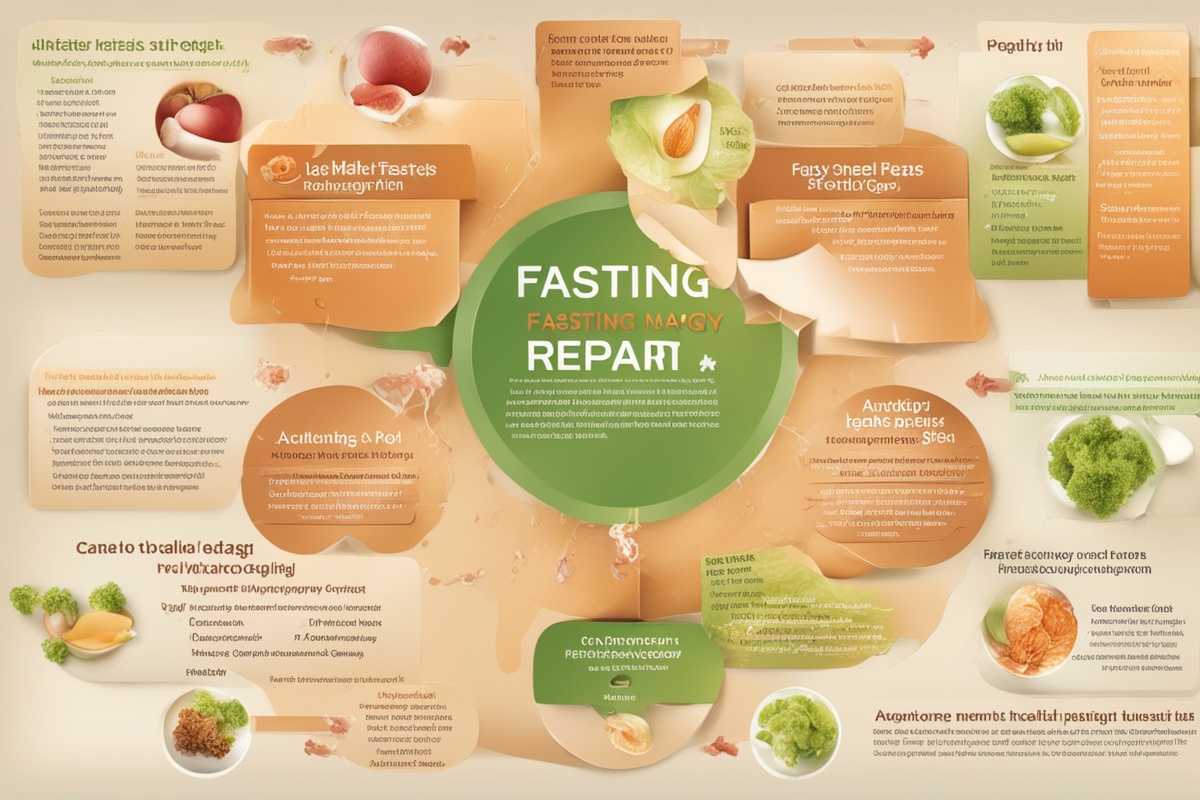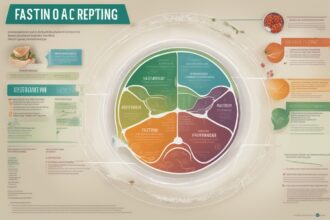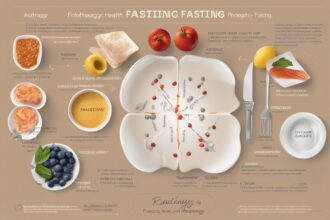Have you ever wondered how your body keeps itself in tip-top shape, even when you’re not actively doing anything to help it? It’s like having a built-in cleaning crew that works tirelessly behind the scenes, sweeping away cellular junk and refreshing your system. That’s the magic of autophagy—a natural process where your cells recycle damaged components to boost renewal and keep things running smoothly. But here’s the kicker: while autophagy happens on its own, there are ways you can give it a nudge, naturally enhancing this cellular cleanup for better health and vitality. Today, we’re diving deep into the art of boosting cellular renewal naturally, exploring practical, science-backed strategies that anyone can adopt. Let’s get started on this journey to revitalize your body from the inside out.
What Is Autophagy and Why Does It Matter for Cellular Renewal?
Autophagy, derived from the Greek words for “self-eating,” isn’t as grim as it sounds. It’s a fundamental process where your cells break down and recycle their own damaged or unnecessary parts—think of it as a cellular decluttering session. This isn’t just about tidying up; it’s about survival. By clearing out dysfunctional proteins and organelles, autophagy helps protect against disease, supports energy production, and even plays a role in longevity. Research, like studies published in Nature, shows that autophagy is linked to everything from improved immune function to reduced risks of neurodegenerative conditions like Alzheimer’s. So, when we talk about boosting cellular renewal naturally, we’re really talking about optimizing this powerhouse process. Isn’t it incredible how much happens at such a microscopic level?
Now, imagine you’re dealing with constant fatigue or feeling like your body just isn’t keeping up. It could be that your autophagy isn’t firing on all cylinders—factors like poor diet, stress, or lack of sleep can slow it down. The good news? You’ve got the power to rev it up without fancy supplements or expensive treatments. Let’s explore how.
Fasting: The Ultimate Trigger for Autophagy
One of the most well-documented ways to kickstart autophagy is through fasting. When you abstain from food for a period, your body shifts gears. Without incoming calories to burn, it turns inward, ramping up autophagy to scavenge for energy by breaking down cellular debris. Intermittent fasting (IF), like the popular 16:8 method—where you fast for 16 hours and eat during an 8-hour window—has been shown to enhance this process. A study from the Cell Metabolism journal highlighted how fasting triggers molecular pathways like AMPK, which directly stimulate autophagy.
I’ve tried intermittent fasting myself, and let me tell you, it’s not just about skipping breakfast. The first few days were rough—hunger pangs had me questioning my life choices! But after a week, I noticed a subtle clarity and energy boost. It felt like my body was resetting. If you’re new to fasting, start small with a 12-hour overnight fast and work your way up. And always listen to your body; if you feel dizzy or unwell, don’t push it. Curious about diving deeper into fasting? Check out our detailed guide on intermittent fasting benefits to see how it ties into cellular health.
Dietary Choices That Support Cellular Cleanup
What you eat—or don’t eat—plays a massive role in boosting cellular renewal naturally. Certain foods and nutrients can mimic the effects of fasting by activating autophagy pathways. For instance, polyphenols found in green tea, berries, and dark chocolate stimulate cellular cleanup. Ketogenic diets, high in healthy fats and low in carbs, also promote autophagy by forcing your body into ketosis, a state where it burns fat for fuel and ramps up recycling processes.
Picture this: You’re sipping on a cup of green tea in the morning, not just for the cozy ritual but knowing it’s packed with epigallocatechin gallate (EGCG), a compound linked to autophagy activation. Or maybe you’re swapping out sugary snacks for a handful of walnuts, rich in spermidine—a lesser-known nutrient that research suggests supports cellular renewal. Small changes like these add up. But a word of caution: balance is key. Overdoing restrictive diets can stress your system, so don’t jump into extreme eating plans without guidance. Want more on autophagy-friendly foods? Head over to our post on autophagy diet tips for a full breakdown.
Exercise: Move Your Body to Renew Your Cells
Here’s a fun fact—sweating it out at the gym doesn’t just tone your muscles; it also turbocharges autophagy. Physical activity, especially high-intensity interval training (HIIT) and resistance training, creates a kind of metabolic stress that signals your cells to clean house. Studies, including one from the Journal of Physiology, show that exercise induces autophagy in muscle tissues, helping repair damage and improve resilience.
I remember starting a simple bodyweight workout routine during a particularly sedentary phase of my life. Just 20 minutes a day of squats and push-ups, and within weeks, I felt stronger—not just physically, but mentally sharper too. It’s like my body was thanking me for waking it up. If you’re not a gym rat, don’t worry. Even brisk walking for 30 minutes daily can get the ball rolling. The trick is consistency—make movement a non-negotiable part of your routine. For more ideas on low-impact exercises that support cellular health, peek at our guide on exercise for autophagy.
Sleep: The Unsung Hero of Cellular Renewal
Ever pulled an all-nighter and felt like a zombie the next day? That’s your body screaming for rest—and for good reason. Sleep isn’t just downtime; it’s when autophagy peaks in certain tissues, especially the brain. During deep sleep, your cells clear out toxic waste, like beta-amyloid proteins linked to Alzheimer’s. Skimp on shut-eye, and you’re essentially clogging up your system.
Here’s a personal tip: I used to struggle with winding down at night, my mind racing with to-do lists. Then I started a simple bedtime ritual—dim lights, no screens, and a quick meditation. It’s not perfect every night, but aiming for 7-9 hours of quality sleep has been a game-changer. If sleep eludes you, try cutting caffeine after noon or setting a strict bedtime. Trust me, your cells will thank you for it. After all, isn’t it worth prioritizing rest if it means waking up refreshed and renewed?
Stress Management: Keep Calm to Cleanse Cells
Chronic stress is like throwing a wrench into your body’s machinery. High cortisol levels can suppress autophagy, leaving your cells bogged down with junk. On the flip side, practices like mindfulness, yoga, or even deep breathing can lower stress and indirectly support cellular renewal. A study in Frontiers in Immunology noted that stress reduction techniques positively influence autophagy markers, proving there’s a mind-body connection at play.
Think about a time when life felt overwhelming—maybe deadlines were piling up, or family drama had you on edge. That’s when I turn to a quick 5-minute breathing exercise: inhale for 4, hold for 4, exhale for 4. It’s simple, but it brings me back to center. Find what works for you—whether it’s journaling, a nature walk, or just laughing with a friend. Reducing stress isn’t a luxury; it’s a necessity for cellular health.
Final Thoughts: A Holistic Approach to Cellular Renewal
Boosting cellular renewal naturally through autophagy isn’t about quick fixes or magic bullets. It’s a lifestyle—a commitment to nurturing your body with the right habits. Whether it’s fasting a few times a week, eating nutrient-dense foods, moving your body, prioritizing sleep, or managing stress, every step counts. Start small, experiment with what feels sustainable, and remember that progress, not perfection, is the goal. Have you tried any of these strategies yet? I’d love to hear how they’ve worked for you—or if you’ve got other tips to share!
By weaving these practices into your daily routine, you’re not just supporting autophagy; you’re investing in a healthier, more vibrant version of yourself. It’s empowering to know that the tools for renewal are already within your reach, waiting for you to tap into them. So, why not start today?
References
- Levine, B., & Kroemer, G. (2019). Biological Functions of Autophagy Genes: A Disease Perspective. Nature.
- Mattson, M. P., & Arumugam, T. V. (2018). Hallmarks of Brain Aging: Adaptive and Pathological Modification by Metabolic States. Cell Metabolism.
- Vainshtein, A., & Hood, D. A. (2016). The Regulation of Autophagy During Exercise in Skeletal Muscle. Journal of Physiology.
- Buric, I., et al. (2017). What Is the Molecular Signature of Mind–Body Interventions? A Systematic Review of Gene Expression Changes Induced by Meditation and Related Practices. Frontiers in Immunology.
This content is for informational purposes only and not a substitute for professional advice.






